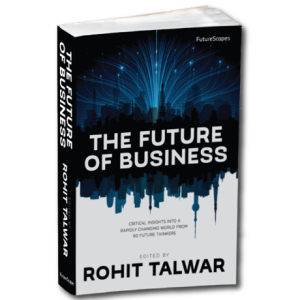The Future of Business: Critical Insights into a Rapidly Changing World from 60 Future Thinkers by Rohit Talwar (editor)
Book review by José Luis Cordeiro
The future is already here, it’s just not evenly distributed.
William Gibson
The best way to predict the future is to invent it.
Alan Key
Disrupt yourself, or be disrupted.
John Chambers
Our intuition about the future is linear. But the reality of information technology is exponential, and that makes a profound difference. If I take 30 steps linearly, I get to 30. If I take 30 steps exponentially, I get to a billion.
Ray Kurzweil, 2005
Rohit Talwar has edited an excellent new book about the future of business, very appropriately called The Future of Business. This new book “explores how the commercial world is being transformed by the complex interplay between social, economic and political shifts, disruptive ideas, bold strategies and breakthroughs in science and technology. Over 60 contributors from 21 countries explore how the business landscape will be reshaped by factors as diverse as the modification of the human brain and body, 3D printing, alternative energy sources, the reinvention of government, new business models, artificial intelligence, blockchain technology, and the potential emergence of the Star Trek economy”.
Other similar books remind us of the radical changes that our societies will experience in the next few years. My Singularity University friends Ray Kurzweil with The Singularity is Near (and now working on The Singularity is Nearer), Peter Diamandis and Steven Kotler with Bold and Salim Ismail with Exponential Organizations have considered the disruptive changes ahead. In fact, the mission of Singularity of University is to “to educate, inspire and empower leaders to apply exponential technologies to address humanity’s grand challenges”. These exponential technologies are the ones disrupting the business landscape as well, and the challenges and opportunities are both enormous. As Peter Diamandis says: “the best way to become a billionaire is to help a billion people”.
In fact, the Silicon Valley mentality considers every problem an opportunity. And through creative destruction, as discussed by famous economist Joseph Schumpeter, there are always continuous opportunities through innovation. As the Silicon Valley saying goes: “fail fast, fail often, and fail forward”. Some experts think that over half of the current Fortune 500 will not exist as such in just two decades. Which companies will survive? Which enterprises will be able to transform and adapt? Which organizations will be disruptors and which ones will be disrupted?
The Future of Business draws on the ideas of over 60 futurists from 22 countries on four continents. It presents a wealth of business ideas distributed on 10 major sections covering a wide set of views to think, act and react about the future:
- Visions of the Future: What are the global shifts on the horizon?
- Tomorrow’s Global Order: What are the emerging political and economic transformations that could reshape the environment for society and business?
- The Emerging Social Landscape: What are we becoming, how will we live?
- Social Technologies: How will tomorrow’s technologies permeate our everyday lives?
- Disruptive Developments: How might new technologies enable business innovation?
- Surviving and Thriving: How can business adapt to a rapidly changing reality? What are the critical success factors for business in a constantly evolving world?
- Industry Futures: How might old industries change and what new ones could emerge?
- Embracing the Future: What are the futures and foresight tools, methods and processes that we can use to explore, understand and create the future?
- Framing the Future: How should organizations look at the future?
- Conclusions: Navigating uncertainty and a rapidly changing reality.
The World Economic Forum (WEF) has been considering most of the same issues. In fact, during its 2016 meetings, some of the main topics considered were radical disruptions and technological unemployment in the future due to advancements in artificial intelligence, robotics, mobile supercomputing, 3D printing, self-driving cars and other exponential technologies. In fact, the founder and executive chairman of the WEF, Klaus Schwab, has published another enlightening book called The Fourth Industrial Revolution, where he explores the impact of this new revolution on businesses.
The Millennium Project has also been developing scenarios about the future of work and technology by the year 2050. The accelerating changes are disrupting not just business, but all society as we know it. Because of the real possibility of technological employment in the coming decades, if not years, some people are advancing the ideas of universal basic income (UBI) or basic income guarantee (BIG). These proposals are coming from both right and left in the political spectrum, which reinforces the urgency about considering these issues very seriously. The Millennium Project is developing three such scenarios for the year 2050, where people can participate with their own ideas about the future.
The Future of Business is a delightful read for those concerned about business and about the future. The concepts developed through the pages of the book by many experts are fundamental to thrive in a world of exponential changes, where we have to carefully navigate in the middle of much uncertainty. The Future of Business is just the first on a list of books to be published in the FutureScapes series by Fast Future Publishing. After this first excellent book, I can’t wait to read the other books coming out in the FutureScapes series, and I would highly recommend them to others as well.
José Luis Cordeiro, MBA, PhD (www.cordeiro.org)
Visiting Research Fellow, IDE-JETRO, Tokyo, Japan (www.ide.go.jp)
Director, The Millennium Project, Venezuela Node (www.Millennium-Project.org)
Adjunct Professor, Moscow Institute of Physics and Technology, Russia (www.mipt.ru)
Founder and President Emeritus, World Future Society, Venezuela Chapter (www.FuturoVenezuela.net)
Founding Energy Advisor/Faculty, Singularity University, NASA Research Park, California, USA (www.SingularityU.org)

